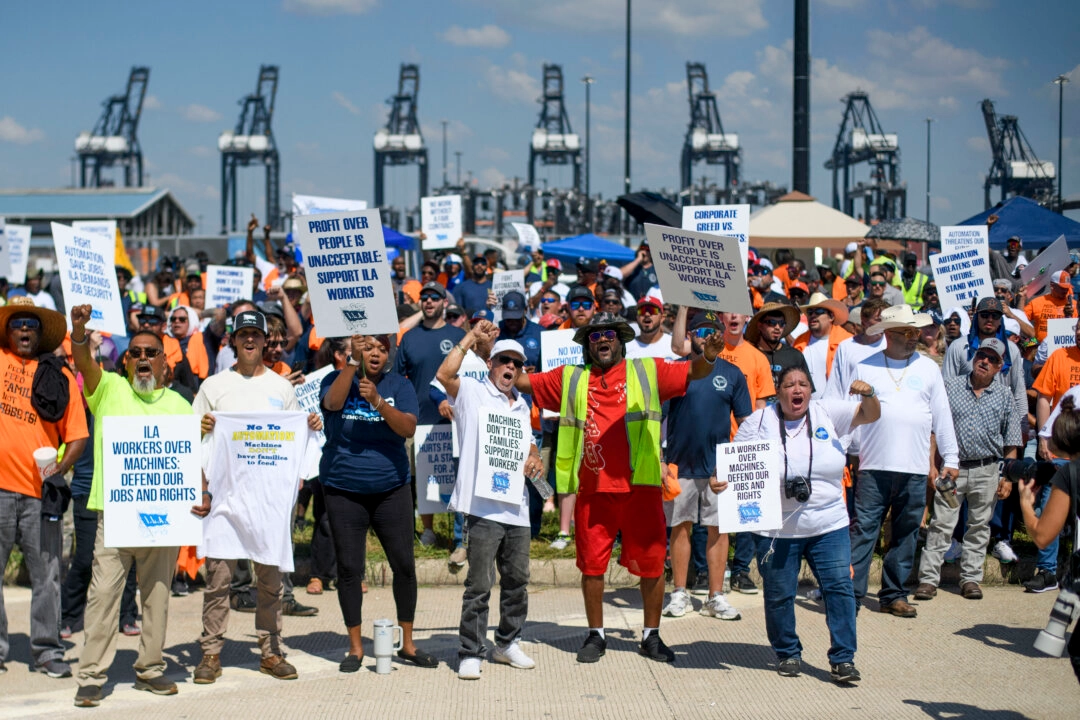By Andrew Moran
Thousands of union dock and maritime workers are officially on strike—a work stoppage that could significantly disrupt the U.S. economy.
The International Longshoremen’s Association (ILA), the largest North American union representing 85,000 maritime employees, rejected a counteroffer from the U.S. Maritime Alliance (USMX).
According to USMX officials, the organization representing East and Gulf Coast longshore industry employers, proposed several wage-related offers.
“Our offer would increase wages by nearly 50 percent, triple employer contributions to employee retirement plans, strengthen our health care options, and retain the current language around automation and semi-automation,” the USMX said in a statement hours before the midnight deadline.
The port ownership group noted that it was hopeful that the counteroffers would resume collective bargaining on other outstanding issues to reach an agreement.
Though the submitted proposal matched some of the ILA leadership’s demands, the union rejected the offer.
In a Sept. 30 statement to the press, the union claimed that USMX “continues to block the path toward a settlement on a new Master Contract by refusing ILA’s demands for a fair and decent contract and seems intent on causing a strike at all ports from Maine to Texas.”
This is the ILA’s first walkout since 1977 and will involve as many as 50,000 members.
The ILA found support from the International Brotherhood of Teamsters just before the walkout.
“The ocean carriers are on strike against themselves after failing to negotiate a contract that recognizes the value of these workers,” said Sean O’Brien, the Teamsters General President, in a late-night statement, urging the government to stay “out of this fight.”

Port Strike’s Economic Effects
The strike is expected to cause full work stoppages at 14 ports across the Atlantic and Gulf Coasts and impact the economy.
These ports manage between 35 and 49 percent of all U.S. imports and exports, with a large bulk of trade occurring at the ports of New York-New Jersey and Houston-Galveston.
Grace Zwemmer, an associate U.S. economist at Oxford Economics, projects that trade flow disruptions could trim GDP growth between 0.08 and 0.13 percent, or as much as $7.5 billion, each week the strike is in effect.
Additionally, stoppages will likely result in product delays and higher consumer and producer prices.
“The good news is that the risk to inflation is limited, as freight rates have steadily dropped since August and ongoing deflation in China has put downward pressure on import prices,” Zwemmer said in a research note.
Industry experts have also warned that the strike could affect the busy holiday season.
“I’m not saying kids will not have toys for Christmas but it can seriously affect goods coming into the U.S.,” said Stamatis Tsantanis, the CEO and Chairman of Seanergy Maritime and United Maritime.
Ahead of the strike, the U.S. Chamber of Commerce urged President Joe Biden to invoke the 1947 Taft-Hartley Act. The measure would allow the president to submit a court order for an 80-day cooling-off period, effectively halting a work stoppage and prompting both sides to head back to the negotiating table.
“Americans experienced the pain of delays and shortages of goods during the pandemic-era supply chain backlogs in 2021. It would be unconscionable to allow a contract dispute to inflict such a shock to our economy,” said Suzanne Clark, the president and CEO of the U.S. Chamber of Commerce, in a letter to President Biden.
A new poll by the chamber found that 57 percent of U.S. voters supported the White House taking action to ensure that the ports remain open and operating; 20 percent were opposed to government intervention.
Commerce Secretary Gina Raimondo told CNBC on Sept. 30 that she “has not been particularly focused” or “particularly involved” in discussions.
President Biden told reporters on Sept. 29 that he would not intervene if the two sides failed to reach a contract.
“It’s collective bargaining. I don’t believe in Taft-Hartley,” the president said.
Meanwhile, various jurisdictions were actively preparing for the strike at ports from Maine to Texas.
Gov. Kathy Hochul (D-N.Y.) said that Port Authority of New York-New Jersey officials were working closely with the commercial trucking industry to make sure cargo of essential goods, food, and medical supplies would be offloaded and shipped to their destinations.
“New York is prepared to support working families if a strike occurs,” Hochul said at a press conference. “People do not need to rush out to the grocery store and stockpile goods like they did during the pandemic. We do not want to see people reach that level of anxiety, because we are not there.”

